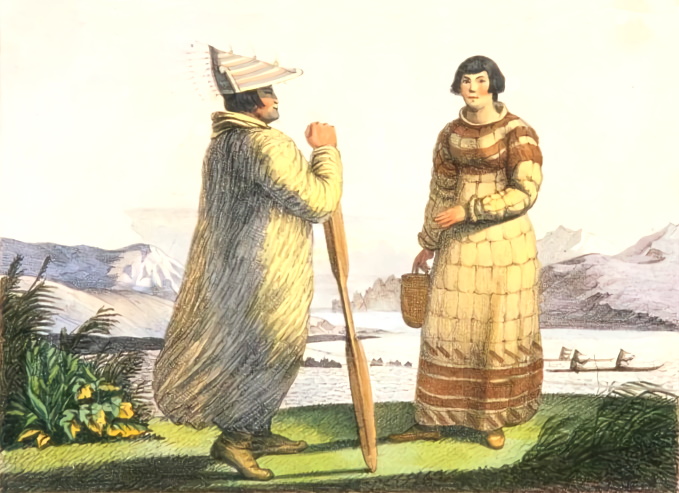ALEUT
Wild Word Friday!
ALEUT (pronounced al-yoot) is a word of undetermined origin that was used by Russian explorers to designate the people who lived on the islands and the peninsula that stretch from southwestern Alaska to divide the North Pacific from the Bering Sea. Some linguists believe that the word ALEUT was derived from the native Unangan word Allithuh, which means community.
Back in the 1970s, I read a small book entitled ALEUTs: Survivors of the Bering Land Bridge by William S. Laughlin. At the time, I was ready to attempt my first novel and wanted to write about Native People of North America, not just any Native People but those who first settled here in prehistoric times. When I read Dr. Laughlin’s book I was absolutely mesmerized by the culture and history of the ALEUT people. They had survived as a distinct and continuous culture group for thousands of years in one of the harshest environments in the world. (Think tidal waves, volcanic eruptions, earthquakes, high winds, and damp, bone-chilling cold.) They had a large percentage of geniuses in their population and were inventors and generally blessed with longevity.
They had survived battles with other Native peoples and the onslaught of Europeans and Americans. Their population was decimated during World War II when some were taken to Japan as prisoners of war and others were moved to displaced persons camps in the United States. Yet each time they fought back to retain their pride and the knowledge of who they were and who they are. How could I resist writing about a people like that?
After nine years of research and writing and rewriting, I completed my first novel, Mother Earth Father Sky, which eventually became a national and international bestseller, published on five continents, in 13 languages, in more than 20 countries. I went on to write five more novels about the ALEUT people.
I decided to feature the world ALEUT on Wild Word Friday this week because I’m delighted to tell you that my six Alaska novels are now being republished by a New York digital and multimedia content publisher, Open Road Integrated Media. (Check them out here: http://www.openroadmedia.com/ )
The books will be released in Ebook format this May 2013. At the suggestion of my publicist, Laura De Silva, I will feature Native words from those books during the next few months on Wild Word Friday. I hope you enjoy this linguistic journey to ancient Alaska as we learn a few “new-old” words together!
Have you ever visited Alaska?
Blessings!
Sue

Did you go to the Aleutian Islands when you visited Alaska? Do they have a museum etc in the area…that is so interesting..Bob and I vacationed in Alaska a few years ago, visited with our son and family, and my daughter-in-law and I drove up the Al-Can 4 years ago…Alaska is a beautiful place…We fished on the Kenai Peninsula and panned gold in Fairbanks at the original river where Pete struck gold…I don’t think I’d like to live there year round though…too many months of half-dusk…Our son-in-law is spending 3 months at a remote village starting next month..He’s a physician assistant and will work in a remote village that is only accessible by air…
Oh Mary, What an experience for your son-in-law! Tough but great, too. Yes, we visited the islands 5 different times and had the privilege of living in the villages, in people’s homes, usually. We still stay in contact with many people that we met there. Your trips sound so wonderful. I would love to drive the Highway in, but Neil was never really enthusiastic about that. Isn’t the Kenai so beautiful!! One of our favorite places. The islands have a few places where you can see artifacts on display. Most often in the schools. I found a lot of very useful info in the museum in Anchorage and also the one at the university in Fairbanks.
How do you pronounce Allíthuh i can’t find it any where
I don’t know how to pronounce it, Evan. I would guess that it sounds somewhat like Aleut, at least to Russian ears, because allithuh is said to be the Native word that the word Aleut comes from. Do we have any Aleut speakers reading this who can do a better job of answering Evan’s question?